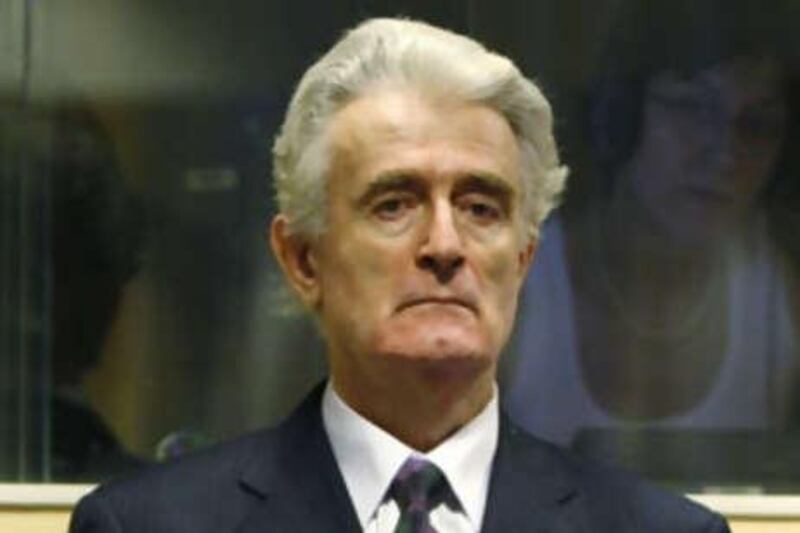THE HAGUE, NETHERLANDS // United Nations judges have said the former Bosnian Serb leader Radovan Karadzic can testify at an appeal hearing for an ally convicted of murdering thousands of non-Serbs during the Bosnian war. Mr Karadzic is in custody awaiting trial on genocide charges for allegedly masterminding atrocities including the 1995 massacre of 8,000 Muslims at Srebrenica and the deadly 44-month siege of the Bosnian capital, Sarajevo.
In a decision released today, Yugoslav war crimes tribunal appeals judges decided to allow him to appear as a witness for one of his closest allies, Momcilo Krajisnik. Krajisnik is a former Karadzic aide who was sentenced in 2006 to 27 years imprisonment for leading - allegedly with Mr Karadzic - ethnic cleansing campaigns to drive Muslims and Croats out of large areas of Bosnia. Mr Karadzic's testimony, which is scheduled for November 3 and 5, could also give an indication of how Mr Karadzic will defend himself at his own trial, which is expected to start next year.
Even though Krajisnik's appeal process is almost over, he has been allowed to call Mr Karadzic because the former Bosnian Serb leader was in hiding during his trial and the early stages of the appeal, and so could not be called as a witness. The appeals chamber said it believed that if Mr Karadzic had testified at Krajisnik's trial his evidence "could have had an impact on the verdict". Prosecutors, who objected to Mr Karadzic being called, had no comment on the decision, the spokeswoman Olga Kavran said.
Mr Karadzic and Krajisnik were close allies as president and parliamentary speaker in the breakaway Bosnian Serb republic known as Republika Srpska, and were reunited in the tribunal's detention centre after Mr Karadzic's arrest on a Belgrade bus in late July after 13 years on the run. In the original verdict on Krajisnik, judges said he and Mr Karadzic ran Republika Srpska "as a personal fief" and described Mr Karadzic as Krajisnik's closest associate.
At an appeals hearing in August, one of Krajisnik's lawyers, Alan Dershowitz, said he had already met briefly with Mr Karadzic and was confident he would help clear his client's name. "He will in fact be providing very significant exculpatory evidence," Mr Dershowitz told judges, without elaborating. Prosecutors have said they proved at Krajisnik's trial that he was involved in a criminal conspiracy, along with Mr Karadzic and other Serb leaders, to create ethnically pure Serb areas within Bosnia that could become part of a "Greater Serbia" envisioned by the former Yugoslav president Slobodan Milosevic.
Mr Milosevic died of a heart attack in 2006 before his trial could be completed. *AP






